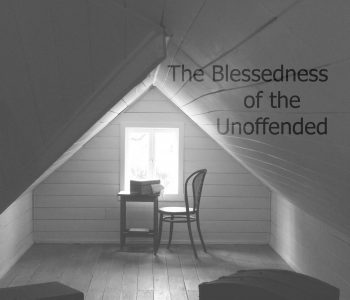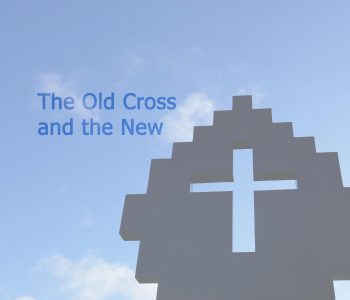 Other Authors
Other Authors
A Form of Godliness
“There are some things in those epistles of Paul that are difficult to understand, which the ignorant and unstable twist and misconstrue to their own utter destruction, just as they distort and misinterpret the rest of the Scriptures” (2 Peter 3:16).
The majority of the epistles were written by the apostle Paul as instruction to the various assemblies which had been gathered out; those believers in the Son of God who was sent down to this earth from the realms above. These letters to the various assemblies were afterwards collected and attached, as we see them, to the gospel message according to Matthew, Mark, Luke and John.
Paul, although the last apostle called out by the Son of God Himself, proved himself to be one of the most ardent, energetic and fearless witnesses to the truth of Christ. Once he was enlightened, he never faltered or wavered, and never shrank from suffering for his belief in Jesus of Nazareth. He fought diligently in the good fight with his whole heart and mind, and rendered wholehearted obedience to God who called him through his Lord and Saviour Jesus Christ who revealed Himself to him time and time again, until at last he shed the last drops of his own sacrifice when beheaded for his unflinching faith and witness to his Lord and Master.
Paul was undoubtedly greatly enlightened by the Spirit of God, but in some instances in his letters he is hard to follow. The other apostles must have noted this, for we see how Peter, when referring to Paul as their ‘beloved brother’ and speaking of what he had written to them, says that “therein are some things hard to be understood, which the ignorant and unsteadfast wrest, as they do also other Scriptures, to their own destruction” (2 Pet. 3:16). Now, this is a warning and one which is very much needed, for there is no doubt about the truth of Peter’s words, and one of the greatest difficulties is the matter of the Law.
Bible readers all know that Israel walked according to the Law given them by God, or at least they thought they did, but Jesus told them that none of them actually did keep the Law. Their priests had set up principles and precepts of their own, and they adhered more strictly to those than to God’s Law. Speaking through the prophet Isaiah, God says their worship had become a mockery. Therefore, God sent His Son with a new order, and it is on account of this new order that difficulties have arisen, especially through Paul’s letters, as he goes very deeply into the matter in order to make it clear; yet there are very few even now who seem to grasp the truth of his explanation.
The epistles to the Romans and Galatians are very much given over to this study, for apparently it was very hard for the Jewish believers to cast aside the covenant which God had arranged with Abraham, a covenant which God said was with himself and his descendants for all time; all his household from generation to generation, both those born in his house and those bought, had all to be circumcised. This compact seems to have been one at least to which Israel adhered, and although those Jewish believers had witnessed the power of God’s heavenly Spirit descending on Gentile believers who had never known anything of circumcision, yet there appeared a fear in them to disobey that covenant, and so they were beginning to teach the Gentiles that they must be circumcised. Even Peter and Barnabas seem to have been swayed by their arguments. But although Paul was the youngest of the apostles, and had not been much associated with the others, his lonely separation unto God alone gave him a great clearness of vision and decisive action. Therefore, he stood firm as a rock and pointed out the folly of their thoughts for, as he said, the very fact that the Gentile believers who had never been circumcised were gifted with the power of God’s Spirit immediately they were baptised into the name of the Father, the Son, and the Holy Spirit, showed that all past covenants were at an end, a new covenant taking its place, at least for the present dispensation.
But it is here that misunderstandings even today arise, causing contradictions and mystifications, and unless we are both careful and prayerful we will be, as many are, led astray from the narrow way of Jesus our Saviour. Paul, in Romans 3:21, says: “But now we have a righteousness of God disclosed apart from Law altogether; it is attested by the Law and the prophets, but it is a righteousness of God which comes by believing in Jesus Christ, and it is meant for all who have faith”. Verses 23 and 24: “All have sinned, all come short of the glory of God, but they are justified for nothing by His grace through the ransom provided in Jesus Christ, whom God put forward as the means of propitiation by His blood to be received by faith”.
Now, this passage and other such, have given rise to an assumption and a declaration that righteousness is not expected in a believer, that the righteousness which God requires is found in Christ alone, and that God is satisfied with us when He looks on His Son, only because we believe and have faith; and they strengthen their arguments by misusing the words of Jesus when He had drunk the cup to the finish which was assigned Him, saying: “It is finished“. They say Jesus did all that was necessary. He became a substitute for believers, and set them free even from the law of holiness, for all time, indeed forever.
We know, of course, that Paul brings Abraham forward as an instance of faith, and that his belief in God’s promise to him was counted to him for righteousness. But while we acknowledge this to be true, we must take everything into consideration. This instance was not the beginning with Abraham and God. We are not given any information regarding God’s dealings with men at that time, but Abraham was known to God beforehand, and God known to Abraham. That seems certain. He was pleasing to God and chosen from among all others, even in his father’s household, for special blessing, just as it was with David, the youngest and most unlikely of his father’s household. Abraham must have been a faithful and obedient servant of God before the call was given him to come away from his father’s people to a land which God would show him. We do not read that he required being told twice. He did at once what he was told, although he knew not where he was going. The obedient spirit was in him. Like the Messiah to whose day he looked forward, his desire and will was to obey God. Abraham must have had much more knowledge of God than is generally thought, thus his obedience and his faith in God.
It has astonished me to read the criticism of Abraham by some religious writers, how they seem to estimate him as in a weaker and lower standard than they themselves. They forget, or surely overlook, the tremendous weight of his obedience and fear of God’s judgment, when he, without word of complaint, took his only son and heir at God’s command to sacrifice him on the altar. Do we know of one, including ourselves, who would do such a thing today in spite of all our profession? Let us put ourselves for a moment in his place and ask ourselves if our faith and fear of God is sufficient to urge us to obedience in such a test. Indeed, I say it in sorrow, that obedience is now struck out of the role in Christian circles; all that seems to be required today is to be a believer, for Christ is the ransom, has paid the price, and finished the work.
Yes, Abraham believed God and it was counted unto him as righteousness, but Abraham’s knowledge of God and His power to bring into being that which according to nature was impossible, caused him never to doubt God’s word though both he and Sarai were beyond the age to bear a son. Sarai had been barren the whole of her life, and here in her old age when hope was long gone, both with Abraham and herself, God said that she would bear a son and heir a year hence, and Abraham believed God. Yes, as Paul says concerning this incident, it was not what he did at that time; he only believed God, but it was not always so with Abraham, James reminds us in his letter to the assembly. When urging them to be doers of the Word, he brings to their remembrance the fact that Abraham was justified by what he did when he offered up his son Isaac on the altar. His deeds co-operated with his faith and was thus complete, and so he says Scripture was fulfilled which says, “Abraham believed God and it was counted unto him as righteousness.” And furthermore, when Abraham had, at God’s command, offered up his only son, God spoke to him and said: “I swear Myself, since you have done this, I will indeed bless you and make your descendants as numerous as the stars in the sky.”
Would that we ourselves stood in Abraham’s shoes, but then, the heavens are now shut up against the earth like brass; there is no coming and going of the angels of God to speak to us good or bad as in former days, and our one hope is in rendering wholehearted obedience to the words that Jesus has spoken (as Paul says himself to the Romans in 6:17), for by these we shall be justified or condemned. “The words that I have spoken shall judge them on the last day” (John 12:48). This is, so far, an explanation and example of Abraham’s faith and belief. They co-operated, as James the apostle says, with his deeds. And does not James further say: “What is the use of anyone saying he has faith if he has no deeds to show? Faith without deeds is dead.”
Now in reading Paul’s epistles are we prepared to say that he differed with James or any of the other apostles? Only those who close their eyes to all else that Paul has said would say so. Here in this very passage, Romans 6:17, Paul, speaking to the Romans, says we are servants of the master we obey. If we yield to sin our service ends in death, but if we render wholehearted obedience to God, this ends in righteousness, in deeds co-operating with our faith.
With regard to the Law and Paul’s explanation of it, I quite agree that one needs God’s guiding, and a full survey must be taken of all that he has said if we would be truly guided. Nevertheless, if honest in heart and desirous to know the truth of the situation, insight and understanding will be given. It is indeed sorrowful enough that there should seem difficulties, but when even what is plainly spoken is twisted and perverted, as is done by some writers, the case is made more grievous than ever.
One writer whose book I have in hand, has come to the conclusion that salvation is a free gift, obtained entirely by grace and belief in Jesus – that immediately a man believes, he is translated into the kingdom of God’s dear Son, made glorious and excellent and perfect in God’s sight, all the inheritance of glory being given to him. He declares that God puts on the believer at once the robe of righteousness which belongs to Christ, not to himself, that God looks at the believer through Christ and not through his own individuality.
Speaking of Paul’s words: “I have been crucified with Christ”, this writer says this must be understood as meaning that when Christ was crucified, Paul was crucified. He declares there was no other way in which he could have been crucified. One can scarcely credit that these words have come from the pen of a very distinguished and recognised believer in Christ! Does it not point to the sorrowful fact that Christ and His positive statements have been bypassed for uncertainties extracted from the epistles? Who could read the stern, uncompromising moral demands (as someone recently described the teaching of Jesus) and say that such a person as this writer could in truth be called a believer? Might not one ask the question: a believer in what? Or in whom? Not in the Lord Jesus Christ, of a surety. Did not the Lord Jesus say, “He that doth not take up his cross (day after day) and follow after Me, is not worthy of Me” (Matt. 10:38)? If the writer of this book did not understand the meaning of these words, Paul did, and so did all the apostles, and they taught their followers, or believers, to do the same.
Paul makes it very plain what being crucified with Christ meant to him. It meant that, being a new creature by having been born again in Christ, he was crucified to this world and the world was crucified to him. He now lived no longer to himself and to the world, but set his affections on the things above, as the Lord had instructed. He renounced all that he ever possessed and counted all as nothing compared with the supreme value of knowing Christ Jesus. “For His sake”, he says, “I have lost everything. I count it all the most extreme refuse in order to gain Christ and to be found at death in Him.”
In this he was but obeying the words of instruction spoken directly by Jesus Himself: “He that renounces not all that he has, cannot be My disciple (or learner)“. And who will say that Paul stood alone in this sphere of action? Did not the 3000 souls brought in on the day of Pentecost do the same, and do we not read how the Hebrew believers followed this instruction also? Paul was crucified with Christ, not on the cross on which Christ was crucified, but by his own cross which he started to bear immediately he was baptized and began to proclaim his belief in the Lord Jesus Christ. As he says by way of example in Romans 8:36, “For Thy sake we are being killed all the day long; we are counted as sheep for the slaughter.” This state of affairs has always been the experience of the true believer, and if it is not so today, it is only because a true stand is not taken. Paul further says: “All who would live the godly life shall suffer persecution.” And to the Colossians he says: “I would make up the full sum of all that Christ has to suffer in my person on behalf of the church, His body.”
To say, as the writer of this book does, that “Christ is all” and that God has given all competency of heavenly glory in Christ as a real gift to the believers forever because of faith in the Son of God who gave Himself for them (that is, the believer is free from any responsibility or obligation, past or future, being made entirely free by Jesus having been substituted for them and thus paying their debt, as they say, their life being hid with Christ in God) is to bypass entirely the instructions of Jesus. Only by doing so could such a decision be reached.
Far from making the way so pleasant and easy, Jesus, after plainly stating the difficulties, advised His hearers that if they contemplated following Him, they should firstly sit down and consider what it meant. Firstly – “You shall be hated of all men for My Name’s sake. You shall be cast out of the synagogue (church). You shall be pronounced mad. They shall say all manner of evil against you falsely for My Name’s sake, for I have not come to bring peace but a sword. I have come to set a man against his father and the daughter against her mother, etc., and a man’s foes shall be those of his household. If you would save your life you shall lose it. Leave all and follow Me. Let the dead bury their dead. A scholar is not above his teacher, or a servant above his lord; if they have called the Master of the house ‘Beelzebub’, how much more will they call His servants? Whoever loves father or mother more than Me is not worthy of Me. Whoever loves son or daughter more than Me is not worthy of Me. He who will not take up his own cross and follow after Me is not worthy of Me. He who has found his life shall lose it, and he who loses his life for My sake shall find it.”
“Not everyone who says ‘Lord, Lord’ shall enter into the Kingdom of heaven, but he who doeth the will of My Father”.
“He who hears these words of Mine and doeth them not shall be likened unto a man who built his house upon sand, and when the storm broke on that house it came down with a great crash”.
“Except your righteousness shall exceed the righteousness of the scribes and the Pharisees, you shall in no wise enter into the kingdom of heaven”.
“Many shall say unto Me on that Day, ‘Lord, Lord did we not prophesy (preach) in Thy name, did we not cast out devils in Thy Name, did we not do many mighty works in Thy Name?’ Then I will declare unto them, I never knew you, depart from My presence, you workers of iniquity (lawlessness)”.
“If your hand or your foot is a hindrance to you, cut it off; better be maimed and crippled and get into Life than to keep both your feet and hands to be thrown into the everlasting fire”.
“It is easier for a camel to get through a needle’s eye than for a rich man to get into the Realm of heaven”.
“Sell what you possess and give it away in alms, make purses for yourselves that never wear out, get treasures in heaven that never fail, that no thief can get at and no moth destroy, for where your treasure is, there shall your heart be also”.
“He who believes in the Son has Eternal Life, but he who disobeys the Son shall not see Life, the wrath of God abides on him”.
“If you abide by what I say, then are you My disciples”.
“If anyone hears My words and does not keep them, it is not I who shall judge him, the words that I have spoken shall judge him on the last day”.
Besides these selected passages, we have further instruction given us with regard to what is expected and required in the life of a believer in Matthew 5-7, and having had these positive statements brought plainly before our eyes, who, with any sense of godly honesty, could say that a mere expression of belief without wholehearted obedience to such instruction given by no less a personage than the Lord Himself, would entitle a man to the free gift of salvation and that he is immediately translated into the Kingdom of God’s dear Son, made glorious and excellent and perfect in God’s sight, having all the inheritance of glory given him? Without conditions of any kind, these so-called believers are said to be saved for time and eternity because they say they believe. All the warnings about falling short of the goal given by Jesus Himself, besides those of the apostles, are brushed aside as of no account, or explained away to the satisfaction of the teacher.
And as regards the Law, the Christian believer is supposed to be completely freed from it, no doubt on account of Paul’s words: “We are done with the Law” and other such expressions. But even that shows a tremendous lack of understanding, or a deliberate closing of the eyes to what appears objectionable, for over and over again Paul shows his appreciation of the Law and all that it contains. Speaking of faith in Jesus to the Gentile believers, he says: “Then by this faith we cancelled the Law”. But he goes on to show how the sinfulness of the flesh has made the Law of none effect and that only in Christ is there any help. He says the Law is holy, spiritual, and for our good, and that although he himself is now under Christ’s Law, he is not outside God’s Law. In Romans 8:1-17 Paul clearly explains the position, saying: “Thus there is no condemnation for those who are in Christ Jesus: the Law of the Spirit brings the Life that is in Christ Jesus, and that Law has set me free from the Law of sin and death. For God has done what the Law, weakened by the flesh, could not do, by sending His Son in the guise of sinful flesh, to deal with sin, He condemned sin in the flesh” – why and for what purpose? – “in order to secure the fulfilment of the Law’s requirements in our lives, as we live and move, no longer after the flesh, but after the Spirit”.
Here is the whole difficulty of the Law explained in this passage. The Law is righteous, spiritual and holy, but then it was given to men of flesh and blood, born in sin and shaped in iniquity, who found it impossible under that dispensation to keep strictly by it. Thus God provided a means whereby they could be cleansed from the sin of their breaches of the Law, in the blood of beasts. But even this provision was abused and the Law more and more broken, until God decided on a new order. That order came by Jesus, the Christ of God. But what does Paul say here in Romans 8? That Christ has made it possible for the Law’s requirements to be fulfilled in our lives. And how is it to be done? By living no more in the interest of the flesh, but of the Spirit, setting our minds on the things above, and not of the things of the earth.
The people of Israel, while striving to keep the Law, were allowed to have their interests on the earth, but since the human heart is selfish, the Law was broken, for the interests of the flesh overcame the righteousness of the Law. For the Israelites, being one great family under God’s supervision and protection, were to treat one another as brothers. The better provided for among them, were to help those in need. The farmer was to be kind and considerate to the men as brothers, and the men had equally to serve their masters with a good heart as brothers also. This is the only of the laws, but an example. The love of prosperity and money got the better of Israel and they forgot their duty to God and to their fellow men. Scripture says money was their god and it seems so to this day.
But their sin is the sin of the world and large, and what is called ‘religion’ makes no difference in this matter. The more people prosper, the more they sin and forget God. It was so with Israel and it is so all over the world even until this day. Therefore, that some might be saved from the destruction which God means to bring on the earth, He sent His Beloved Son from heaven with a new order. But is that new order obeyed any more than the old one? How could it be expected when no law is recognised and obedience is not required? Where there is no law there is no need for obedience. This is the state the “only believe” and “once saved always saved” policies leave us in. Paul’s words; “The freedom with which Christ has set us free” being wrongly interpreted has led to a careless, go-easy and do-as-you-think-best-yourself policy, until the Christian profession, (or ‘faith’ as it is called unto himself) as Paul says of Gentile sinners, is run on very many different principles, everyone being a law unto himself, as Paul says of Gentile sinners.
Now, before we pass on to the gospel message, let us remind ourselves of yet another word spoken to the church at Rome by Paul himself, viz.: “For it is not the hearers of the Law who are just in the eyes of God; it is those who obey the Law who will be in the day when God judges the secret things of men, as my gospel holds by Jesus Christ”. Here we have the Law spoken of Jesus Christ. Here we have the Law spoken of as by the gospel by Jesus Christ, that gospel is a matter which calls for obedience still. This should not astonish the ardent reader of the gospel message, since one of the first things which Jesus said when teaching His disciples on the Mount of Olives was: “Never imagine that I have come to destroy, but to fulfil. I tell you truly, till heaven and earth pass away, not an iota, not a comma will pass from the Law until all is in force; therefore whosever relaxes a single one of these commands, were it even one of the least, and teaches men so, he will be ranked least in the kingdom of heaven, but whosoever obeys them and teaches them He will be ranked great in the realm of heaven”.
Now, this is the teaching of Jesus to His disciples, and when consideration is given to Paul’s words to the Romans as stated, we see Paul’s stand plainly that, as he says to the Corinthians, although he is under Christ’s Law, he is not outside God’s Law. But before we go any further let us consider this matter of Christ’s Law, since according to modern belief there is no law in Christ. Well, as I have stated in another earlier paper, if we take note of what Jesus said to His disciples in Matthew 5-7 alone, we will see that much of the instruction there was according to the Law as given to Moses, it was “an eye for an eye and a tooth for a tooth”, a very just law and one which should have made man think twice before injuring his brother. But now under Christ’s law we must turn our other cheek when smitten; we are not to resist, or return evil for evil. This is almost impossible to human nature, for the impulse is for revenge and that quickly. So likewise, if anyone should steal your coat, according to the Law of Moses he must be brought to court and punished, but here in Christ’s Law we must allow the thief to have our cloak as well. And so it is all through according to Christ’s instructions and commands, a Law indeed, and one which few observe.
Who could read John 13-17 and say that there is no law and no command in the teaching of Jesus? We could say as the writer of this book I mentioned says, that the “ifs” were only introduced in the Law of Moses because Israel had not recognised the blessing brought to Abraham by grace alone, and that now in Christ we are under the Abraham blessing, under grace, because we simply believe as Abraham did! Surely there is a willful blindness to Christ’s teaching when anyone could make a statement such as this? All through Christ’s teaching the “ifs” are introduced, over and over again, as for example:
“If you abide by My word then are you My disciples”.
“If you keep My commandments you will remain in My love, just as I have kept My Father’s commandments and remained in His love.”
“If any man hears My words and does not keep them, it is not I who judge him, the words l have spoken shall judge him on the last day.”
These are a few of the “ifs” in connection with the conditions of our discipleship. Then there are the “cannots” which point to things which would be a positive hindrance to entering into fellowship with Christ, such as that passage in Luke 14:
“Whoever does not carry his own cross and come after Me, he cannot be My disciple”.
And next: “Except your righteousness exceeds the righteousness of the Scribes and the Pharisees, you cannot enter the Kingdom of heaven (or “you shall in no wise enter into the Kingdom of heaven”). These are a few examples of the conditions in connection with our acceptance into the fold.
Then there are the many warnings given against the possibility of our falling out of the way, which are taken no notice of by those who declare that once a man is saved he is always saved.
Even the epistles, from which so much error is taken, warns the believer over and over again lest he be careless and fall away from the true path. Paul says of himself that he runs the race without swerving, not planting his blows upon the empty air. No, he mauled and mastered his body, lest after having preached to others, he himself might be disqualified. He then reminds them of the Israelites in the desert, how they all lived under the cloud, and all crossed through the sea, all were baptized unto Moses by the cloud and by the sea, all ate the same spiritual food and all drank the same supernatural drink, etcetera, yet with most of them God was displeased, and they were laid low in the desert. Now, he says, this took place as a warning for us, to keep us from craving for evil as they craved.
Again, to the Hebrews Paul says: “See that you do not refuse to listen to His voice, for if they failed to escape who refused to listen to their instructions upon earth, much less shall we escape if we disregard Him who speaks from heaven”. It should be remembered here that Paul is addressing believers, and believers who had entered at the strait gate.
And again to the Hebrews he says: “Anyone who has rejected the Law of Moses dies without mercy on the evidence of two or three witnesses. How much heavier do you suppose will be the punishment assigned to him who has spurned the Son of God, who has profaned the covenant blood with which he was sanctified, who has insulted the Spirit of grace?” Here also believers are being addressed.
Again: “Well then, as the promise of entering into His rest is still left to us, let us be afraid of anyone being judged to have missed it”.
Again: “For if we sin willfully after having received the knowledge of the truth, there is no longer sacrifice for sin left, nothing but a fearful outlook of doom, of that wrath which will consume the foes of God”.
Again: “Now, brothers, I would have you know the gospel I once preached to you… the gospel by which you are saved, provided you adhere (hold fast) my statement of it”.
Again: “No soldier gets entangled in civil pursuits, his aim is to satisfy his commander”.
Again: “A competitor in the games is not crowned unless he obeys the rules”.
Again: “Now we are this house of God, if we only hold on confident and proud of our hope”.
Again: “Brothers, take care lest there be a wicked unbelieving heart in any of you, moving you to be apostate from the living God”.
And again: “Let us worship God acceptably with godly fear and awe, for our God is indeed a consuming fire”.
These are all warnings given to believers, and in the face of those warnings how could any honest believer declare that once a man is saved, so-called, he cannot be lost? Paul did not say so, nor did any of the apostles, and if we refer to Jesus Himself, do we find Him saying so? No, on the contrary, He says: “Any branch in Me that does not bear good fruit is cut off and cast into the fire”.
And again; “Salt is good, but if the salt has lost its savour, wherewith shall the earth be salted? It is thenceforth good for nothing but to be thrown outside and trodden underfoot”.
Yes, and when speaking of the trials and tribulations of the last days of the age, what does Jesus say? “He who continues faithful to the end, the same shall be saved”.
And again: “Be thou faithful unto death and I shall give you the crown of life”. He who believes in the Son has eternal life indeed, but under what conditions? Obedience. Does not the passage end in these words: “He who disobeys the Son shall not see life.” “If you keep My commandments, then are you My disciple.” “You are My friends if you do what I command you.”
Who could read these words spoken directly by the Son of God Himself, and say that a man need only believe and he is immediately translated into the kingdom of God’s dear Son, receiving all the glories of the faithful forever, that Christ is his substitute, and that God looks to the righteousness of Christ for us, that Christ has done all, finishing the work on the cross, and that we need only believe, for our life is hid with Christ in God? Only by bypassing the gospel message (as I have already said) and turning in preference to the epistles of the apostle Paul where misunderstandings arise which seem to provide an easier and more pleasing proposition, could anyone so deceive oneself. Had the position been so pleasant and easy to obtain, Paul would have had no need to shed bitter tears for some who were swerving from the straight path. He would have had no need to be in travail all over again, as he says, for the safety of their souls. Who could honestly say that the “ifs” of the Law given to Israel are now with us a thing of the past because we are under grace?
Yes, indeed, it is by God’s grace we have any chance of abdication from the wrath to come, but that grace is not extended to all, but only to those who have ears to listen to the conditions and are willing to abide by them: “He who hears the words of Mine and does them shall be likened unto a man who built his house upon the rock, but he who hears and does them not shall be likened unto a man who built his house upon the sand”. “If you know these things, happy are you if you do them”. These are the words of Him whom God sent in grace and mercy to provide us with a way of escape from the wrath to come and death eternal.
The writers of the epistles, one and all, were men who, in every particular, even to the sacrifice of their own life’s blood, obeyed to the letter all the commands and instructions they had received in the Lord Jesus Christ, and which of them more than Paul? He bore, as he said, the stamp on his own body of the Lord Jesus. Often at the point of death, he was five times lashed with forty lashes, three times beaten by the Romans, once stoned, three times shipwrecked and adrift at sea, in danger of thieves and robbers, through danger among false brothers, through labourings and hardships, through sleepless nights, starving many a time, cold and ill-clad, and added to all this the pressing cares for the assemblies each day. Yet he says: “If there is to be any boasting, I will boast of what I am weak enough to suffer”.
This is he from whose epistles so much misunderstanding has developed, and who will say that he did not take up his own cross and crucify himself to this world? Who, with any sense of godly vision, would say that Paul himself was crucified when Christ was crucified and that there was no other way in which he could be [crucified]?
“He who saves his life shall lose it, and he who loses his life for My sake shall save it”. To one who asked what good deed he should do that he might have life eternal, Jesus replied: “If thou would enter into Life, keep the commandments” (Matt. 19:17).
To say that our salvation is the work of Christ alone and that His merit is attributed to those connected with it, is to ignore or overlook Paul’s instructions to the Philippian believers: “Work out your own salvation with fear and trembling“. Certainly every blessing comes to us through Jesus Christ, the holy Son of God. Grace and reality, as John said, came by Him. But our salvation is in listening to His instructions and obeying them, following in His footsteps as did the apostles. “He who hears these words of Mine and does them not shall be likened unto a man who built his house upon sand, but he who hears and does them shall be likened unto a man who built his house upon rock.” When the storm broke upon that house it stood the test, so therein is our salvation – obedience to the command. If we would share in the saving power brought through Jesus Christ, we must take up our own cross day by day, as Luke records, and crucify our own carnal desires, that the Life of Jesus may be manifest in our lives, as Paul says, living no longer after the flesh, but after the Spirit of God.
Herein lies the explanation of all the difficulties which arise in Paul’s epistles concerning the Law. As Paul himself says: “the Law is holy and for our good.” Jesus says: “Whoever relaxes a single one of these commands, were it even one of the least, and shall teach men so, he shall be ranked least in the Kingdom of heaven.” With these positive statements before us we cannot but seek to understand the truth of the situation as it stands in this dispensation.
Israel failed miserably and definitely, thus the dreadful sorrows which have been sent on her, and thus the coming of the Son of God in a new order; but that new order was not to dispose of the Law of God, but to make it possible to be obeyed! The difficulty with Israel was that they tried to keep God’s righteous laws in the strength of the flesh, while their interests were divided between earth and heaven, and since the earth was closest to them and all its contents close to their human hearts, their attentions, although they kept up a form of godliness, they were centred more upon the earth, and their form of godliness became a mockery in the eyes of God.
God, seeing those divided interests, especially those which concern the heavens and the earth, do not work successfully, sent us, through His Beloved Son a means of salvation from a hopeless state. That means this, as Paul says in Romans 8:3-4, “through sending His Son in the guise of sinful flesh, to deal with sin, He condemned sin in the flesh in order to secure the fulfilment of the Law’s requirements in our lives, as we live no more after the flesh, but after the Spirit”.
Only in this way can God’s Law and commandments be obeyed. Thus it is that those who would escape the wrath to come must of necessity take up their own cross daily and crucify themselves to this world, as Paul gives us example. Jesus’ instructions are: “Set your affections on the things above, and not on the things of the world.”
It is not surprising that there is so much confusion today in so-called Christian circles as to what is the truth of the situation, when men set aside the all-important and definite statements of Him whom they call “Lord”. It is evidently not a new spirit; it seems to have prevailed even when Jesus was here on earth, therefore He said to some then: “Why call Me ‘Lord, Lord’, and not do what I say?” Today, and for many days past, while the Name of Jesus is extolled to the heavens and His praises sung in church and state, men traversing sea and land to proclaim His Name to all and sundry, His words of instruction are passed by and preference given to the Epistles, where they lay hold of what seems to them more pleasing and fitting propositions. The result being that everyone seems to be a law unto himself, each taking his own meaning out of the writings of the apostles, especially Paul’s, and so we are now confronted with a situation which offers us many different courses, hundreds of them, all claiming to be the way of salvation, although they all differ one from the other.
Had men kept by the word of law and command as laid down by Jesus the Son of God, there would have been but one course, and all who walked according to that course would, as the apostle Paul urged the church, have spoken the same thing.
Christendom has fallen into Israel’s condition, holding a form of godliness, but denying the power thereof. Like Israel, they have submitted to the righteousness of their own, and each sect or church runs according to its own dictates, yet again like Israel, they call upon the Name of the Lord and say: “Is not the Lord with us? No harm shall come upon us…”. Millions of people are living under those different spheres of godliness; would that I could persuade myself honestly that they might be accepted by God. But when I look at the stern, uncompromising moral demands made by God’s Son, the definite “cannots” and “ifs” and “excepts” which precede the following: “…you will in no wise enter into the Kingdom of heaven“, I tremble for their safety. Indeed, when one has done all, we learn to walk in fear, remembering the words of the prophet Zephaniah: “Seek the Eternal, all you humble folk who do His bidding, seek to be honest, seek to be humble, it may be you shall be hidden in the day of the Lord’s wrath.” And again, the words of the apostle Peter: “If the righteous scarcely be saved, where shall the ungodly and the sinner appear?”
Now, regarding Paul’s explanation of the Law to the church at Rome and also to the Galatians, it should be remembered that these churches were Gentile believers. They had never been under the Law which Israel as a nation were deemed to observe, and as has already been said, some of the Jewish believers were persuading them that they must be circumcised; a covenant which had come to them through Abraham, being part of the Law by which Israel was required to live. The Law was holy, spiritual and righteous, but it proved too much for the natural instincts.
Paul speaks very plainly in Romans 7 of his own experience. He agreed with the Law in his natural state, that it was holy and for our good and he desired to walk according to it, but try as he could, he found himself unable, because of the weakness of his flesh to do what the law required of him, and he grieved about it. However, God had provided a means for Israel’s cleansing from their breaches of the Law in the blood of beasts, but Israel, taking full advantage of this provision, went from bad to worse until God resolved to withdraw that provision, and to shut the temple doors against them previous to this. However, He sent His Beloved Son with an entirely new order, not to destroy the Law, but to provide a means whereby it would be possible to observe it, and that was through putting the flesh with all its natural instincts and desires to death daily.
It is here the new birth is explained. As Jesus said to Nathaniel: “You must be born anew” – born of the Spirit of God, for the flesh with its earthly desires profits nothing. Paul by this time had been made to see the reason why he could not keep the Law, and he therefore says: “Who will deliver me from this body of death? God will, thanks be to Him through our Lord Jesus”. Jesus had come with a new order, and Paul was now under this new order. He had taken up his own cross and crucified himself to the world and all its interests which had prevented him in his past days from obeying God’s law. It was into this new order the Gentiles had been brought, an order which had no more to do with cleansing by the blood of beasts, but by the precious blood of God’s Lamb.
All the old regulations attached to the Law as given to Moses had come to an end in this present dispensation, for God determined to remove the temple, the only house of God in the world which He sanctioned, and Israel was to be left without until her term of punishment had expired. Thus Paul could say to these Gentile believers: “We are done with the Law”, although in consideration of Jesus’ words in Matt. 5:17-19 and also Paul’s words elsewhere, the words “as arranged and observed by Israel” might have been added, for this was really how the matter stood.
We are now, in Christ, done with the methods of worship as arranged for Israel. We shall have no temple in which to sacrifice the blood of beasts, for now we worship no longer in Jerusalem or on the mountains of Samaria, we worship in the Spirit and in reality (John 4). Israel’s worship consisted of outward regulations, but our worship is in the Spirit and in reality. Circumcision, which was the chief trouble with Jewish believers, had become merely an outward obligation, but Paul says circumcision is a matter of the heart: spiritual, not material. Our instructions concerning the new order must therefore be according to the words spoken by Jesus Christ, the Son of God, sent down from heaven. If we turn back to the outward obligations of the Jewish Law in one thing, we are done with Christ, and are obliged to carry out all concerned with it.
This, in short, is the explanation of the difficulties which arise concerning the Law in Paul’s epistles. And if we take note particularly to what he says in Romans 8:1-17 we cannot but see the whole thing, as it were, in a nutshell: “God has done what the Law, weakened by the flesh, could not do, by sending His Son in the guise of sinful flesh to deal with sin, He condemned sin in the flesh, in order to secure the fulfilment of the Law’s requirements in our lives, while we live no more after the flesh, but after the Spirit”.
This is the sum and substance of the whole contention.
When Israel is at last redeemed and forgiven, and gathered under Christ into the promised land, the Law shall then be written in their hearts, and they shall never stray from Him again. This is how it should be with all true believers now, but since we are still hampered with a sinful flesh which has to be controlled daily and hourly, and since we live before Satan is bound, we are graciously provided with a means for our cleansing, should we slip, in the precious blood of God’s Lamb, “If we walk in the light” (as John says) “we have fellowship one with another, and the blood of Jesus Christ, God’s Son, cleanses us from all sin” (1 John 1:7). Here again we are confronted with one of those “if’s” from which some seem to have closed their eyes.
“Understand this, that in the last days dangerous times will come. For people will be lovers of self, lovers of money, boastful, arrogant, revilers, disobedient to parents, ungrateful, unholy and profane, unloving, irreconcilable, malicious gossips, devoid of self-control, brutal, haters of good, traitors, reckless, conceited, lovers of pleasure rather than lovers of God, holding to a form of [outward] godliness (religion), although they have denied its power [for their conduct nullifies their claim of faith]. Avoid such people and keep far away from them.” (2 Tim. 3:1-5 AMP).
Author & date unknown, written before 1971.
This message was among unpublished documents left by T. Austin-Sparks, simply titled “The Epistles”. It was undated and without an assigned author.



















